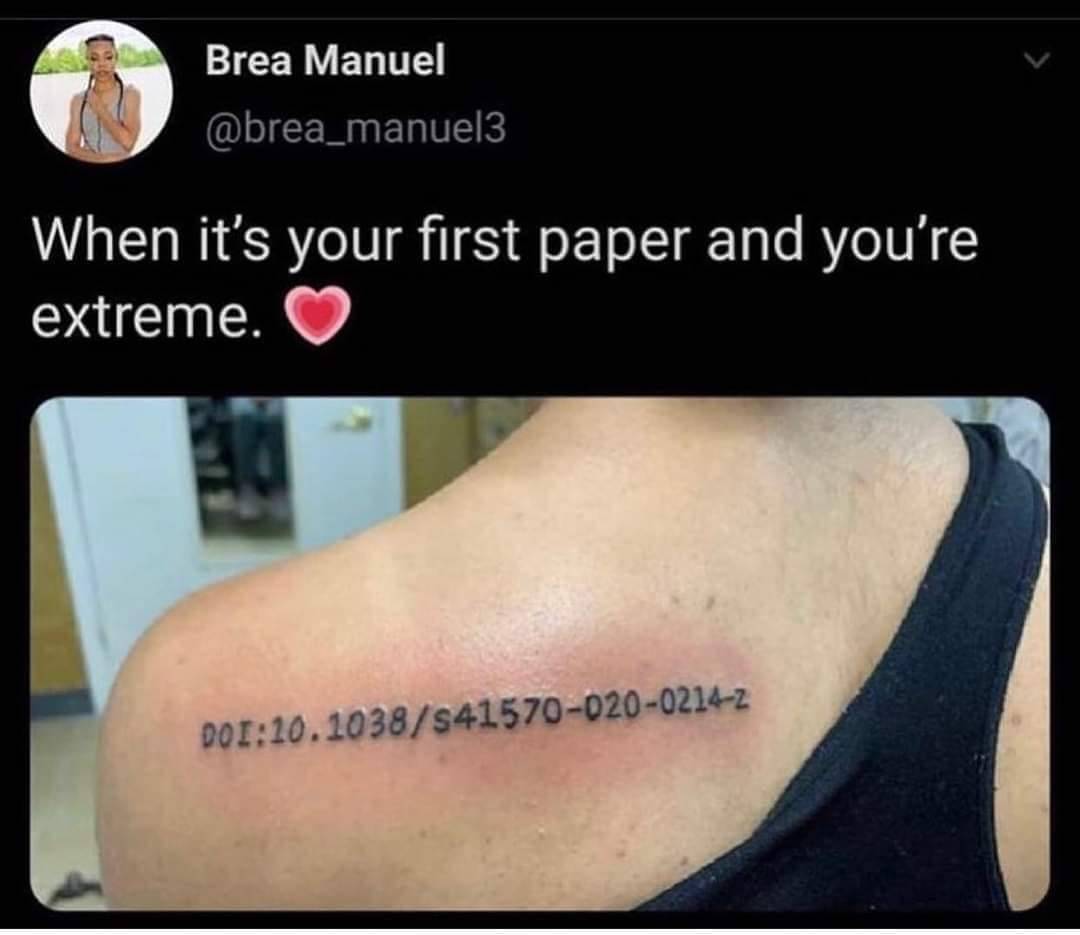this post was submitted on 07 May 2024
547 points (97.2% liked)
Science Memes
12384 readers
1291 users here now
Welcome to c/science_memes @ Mander.xyz!
A place for majestic STEMLORD peacocking, as well as memes about the realities of working in a lab.

Rules
- Don't throw mud. Behave like an intellectual and remember the human.
- Keep it rooted (on topic).
- No spam.
- Infographics welcome, get schooled.
This is a science community. We use the Dawkins definition of meme.
Research Committee
Other Mander Communities
Science and Research
Biology and Life Sciences
- [email protected]
- [email protected]
- [email protected]
- [email protected]
- [email protected]
- [email protected]
- [email protected]
- [email protected]
- [email protected]
- [email protected]
- [email protected]
- [email protected]
- [email protected]
- [email protected]
- [email protected]
- [email protected]
- [email protected]
- [email protected]
- [email protected]
- [email protected]
- [email protected]
- [email protected]
- [email protected]
- [email protected]
- !reptiles and [email protected]
Physical Sciences
- [email protected]
- [email protected]
- [email protected]
- [email protected]
- [email protected]
- [email protected]
- [email protected]
- [email protected]
- [email protected]
Humanities and Social Sciences
Practical and Applied Sciences
- !exercise-and [email protected]
- [email protected]
- !self [email protected]
- [email protected]
- [email protected]
- [email protected]
Memes
Miscellaneous
founded 2 years ago
MODERATORS
you are viewing a single comment's thread
view the rest of the comments
view the rest of the comments

Might be obsolete after a bit though. A QR code only points to a URL and that might change (unlikely, but after 20 years...)
QR codes can contain just about anything, including the URI (
doi:foobar) form that the tattoo uses. QR codes themselves will probably go the way of USB: In a million years there's going to be someone looking at the driver code saying "you sure we can't get rid of those early versions" just for someone to chime in saying "your keyboard still uses USB1".A QR code can also just contain plain text. It's just usually used for URLs.
Plain text can also encode plain text. Why are we complicating this?
Because you can't read the article by reading it's number, and there isn't enough room for the whole article on normally visible parts of the body (not to mention the cost of that tattoo).
The QR code would give you a way to copy/paste the id so you can actually give and, you know, read the thing.
because a qr code containing the ~15k characters of the paper would be a full back piece of tiny dots. Probably unreadable anyways.
Wonder what an appropriate error correction level would be for QR tattoo
Probably loads less then you would need for signage. I reckon you could get away with no redundancy if you went with a large enough base size on the grid.
You can go as far as replacing the square “pixels” with circular dots and it still reads fine, qr codes are kind of amazing.
Awesome!
DOIs are forever. It's why they exist.
You can make QR codes that copy text to a clipboard right? Can't you just make it a DOI search term? Or pay $2/yr for a redirect domain that you can point to where you want later
Sure, but that $2/yr company goes out of business after 10 years and the QR code stops working.
I guess making the number just copy into your clipboard would be a decent option, but you can also just copy/paste text from images now, so why go through the trouble of QR coding it when that only makes sense to a computer?
Even if your registrar goes out of business ICANN will help you restore the domain with a new registrar.
Source it happened to one of my customers.
A numerical .xyz domain costs less than a dollar a year, and you can make as many redirect links as you want.
It costs less than a dollar for the first year. After that, who knows.
The plain text is much more reliable than any url.
This is from the registrar itself back in 2017.
Where are you getting domains for $2 per year?
Namecheap xyz domains are less than $3 after tax for the first year. Subsequent years are around $10.
That's not really $2 per year. Info domains used to be dirt cheap, but even those are pretty expensive after the first year now.
You can get word-vomit domains that are made for QR/imbedded links. No human is typing those out and they do nothing for SEO, so they're a pittance.
.xyz Domains that are just numbers are $1 per year. and netcup has a deal a few times a year that prices .de domains at 1,30€ per year.
A QR Code encodes a string of text. In can be a URL, or anything else. Like the DOI string above, a quote, or whatever. You can't do full Unicode I think, it's 8859-1, or something like that, although there's also an Asian variant.
But your camera phone can already copy text. If it's a tattoo about the first paper you wrote, whatever you make needs to work for 60+ years. Text is always going to be valid, who knows when QR codes will become obsolete. 60 years ago you'd be getting a tattoo of a punch card, and that would be mostly meaningless today.
My camera phone can’t copy text :(
(Original iPhone SE, so not recent, but not ancient or a flip phone or anything)
I was just addressing the fact that QR Codes were only for URLs. As for whether they'll be around in 60 years... Barcodes have proved to be fairly resilient.